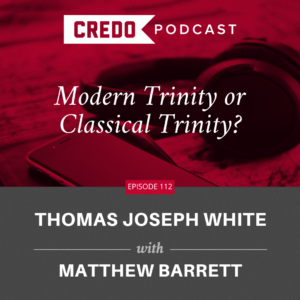Show Notes
 Many moderns constructed their doctrine of the Trinity according to Rahner’s rule, which says the immanent Trinity is the economic Trinity and the economic Trinity is the immanent Trinity. But should Christians even frame the Trinity in these terms? Are we conflating the Trinity with history itself by affirming this principle? But more broader still, how indebted is modern theology’s doctrine of the Trinity to the Enlightenment?
Many moderns constructed their doctrine of the Trinity according to Rahner’s rule, which says the immanent Trinity is the economic Trinity and the economic Trinity is the immanent Trinity. But should Christians even frame the Trinity in these terms? Are we conflating the Trinity with history itself by affirming this principle? But more broader still, how indebted is modern theology’s doctrine of the Trinity to the Enlightenment?
In this episode, Thomas Joseph White joins Matthew Barrett to differentiate between variations of modern and neo-orthodox approaches to the Trinity, taking a complex era and deciphering its turn away from Nicaea. White also helps listeners distinguish between a modern Trinity and a classical Trinity, encouraging us to adopt the language of processions and missions. Given his new research, White moves Christians away from a historicized understanding of the Trinity that looks to the economy to constitute the Trinity. In the end, White encourages us to pursue the revival of classical trinitarianism, which alone can overcome the obstacles of the last century.
Thomas Joseph White is the Rector Magnificus of the Pontifical University of St. Thomas (Angelicum) in Rome. He is the author of many books including most recently, The Trinity: On the Nature and Mystery of the One God (Catholic University Press, 2022). He is the co-editor of the journal Nova et Vetera, a Distinguished Scholar of the McDonald Agape Foundation, and a member of the Pontifical Academy of St. Thomas Aquinas.
Matthew Barrett is the author of Simply Trinity: The Unmanipulated Father, Son, and Holy Spirit (Baker). He is the founder and executive editor of Credo Magazine and host of the Credo podcast. He is associate professor of Christian theology at Midwestern Baptist Theological Seminary. He is currently writing a Systematic Theology with Baker Academic.
